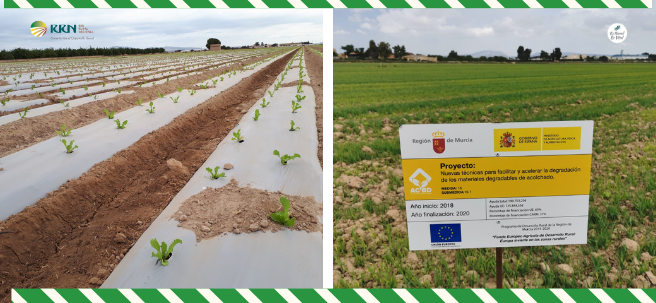
18 de December de 2020
December 18, 2020. The Biodegradable Mulching Operational Group (ACBD) is exploring new techniques to facilitate and accelerate the degradation of biodegradable mulching materials in agricultural production. The goal of this project is to improve the competitiveness of horticultural farms in the Region of Murcia by developing techniques that allow for soil composting of biodegradable plastics, avoiding the formation of plastic fragments that could affect the quality of the product, as well as the crops. And what is composting? Humus obtained artificially by the hot biochemical decomposition of organic waste.
- The Biodegradable Mulch Task Force has been chosen by the European Partnership for Innovation (AEI-Agri) as an example of innovation for European agricultural production.
- The objectives of his research are to improve the competitiveness of horticultural farms in the Region of Murcia and place this autonomous community within the scope of the circular economy.
 |
What is the ultimate and underlying objective of this project? It is to transform the linear economy into a circular economy. This shift entails a significant transformation of our current production and consumption patterns, which in turn will have a significant impact on the economy, the environment, and society. Understanding these impacts is crucial for new agricultural research, as well as for new rural policies.
Example of innovation
The AEI-AGRI Network (European Innovation Partnership) has selected the Biodegradable Mulch Task Force as an example of innovation for European agricultural production . Its November publication includes an article by project coordinator Abelardo Hernández. This article reviews the work carried out to optimize the degradation rate of biodegradable plastics.
Hernández recalls how the project began: “Several producers asked us for a solution to deal with the plastic waste left behind in their fields every time a crop was harvested, leaving small pieces of mulch mixed in with the soil.” In Hernández's words, “accelerating the degradation rate of agricultural plastics, taking into account the actual growing conditions in southeastern Spain, improves the competitiveness of agricultural companies and complies with the principles of the circular economy.”
What have they learned so far? Abelardo states, “We have discovered that to increase the speed and level of degradation of the biodegradable mulch film, the soil must be plowed to a depth of about 25 centimeters. At this depth, there is sufficient moisture and organic matter to ensure microbial activity. After plowing the film into the soil, we need to introduce a second crop to achieve a sufficient level of degradation. This second crop provides additional moisture and organic matter, which enhances the microorganisms involved in the degradation process.”
Operational Group with continuity
The project is expected to be completed by the end of 2020, but several loose ends remain. Therefore, the project partners, with the addition of some new partners, are preparing another project proposal. Abelardo Hernández states that "in the second project, we aim to accelerate degradation using native soil microorganisms without the need for a second harvest."
The Biodegradable Mulch Operational Group (ACBD) is comprised of the companies Verdimed, Fruca Marketing, Kernel Export, Bonduelle, and Campo de Lorca, and is coordinated by the Association of Fruit and Vegetable Producers-Exporters of the Region of Murcia (PROEXPORT). The project is funded by the European Union's EAFRD funds, within the framework of the Region of Murcia's RDP.











